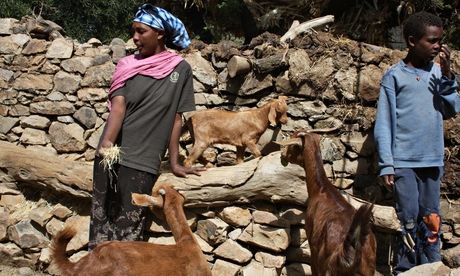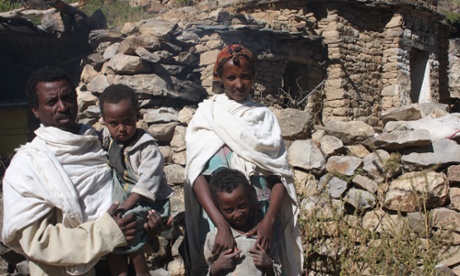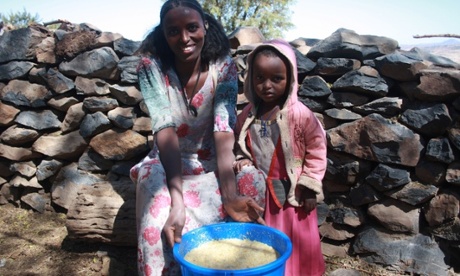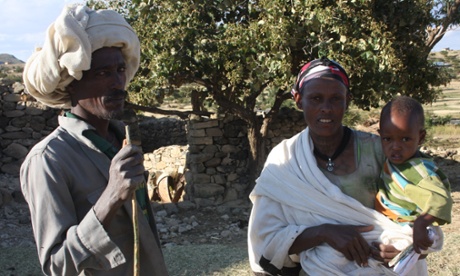Villagers discuss the impact of Farm Africa’s goat-rearing, beekeeping and irrigation programmes a year on from the 2013 Guardian Christmas appeal donations to the Tigray Food Security project
 James Jeffrey in Adwa, Ethiopia
James Jeffrey in Adwa, Ethiopia

By 2013, widowed Letay Gebre-Michael could feed her children only two meals a day. Now she serves three meals daily with an afternoon snack, thanks to three goats she received from international NGO Farm Africa.
Each goat gave birth to two more giving Gebre-Michael a herd of nine. She donated three goats to another qualifying individual – a requirement of beneficiaries of Farm Africa’s goat-rearing programme – and sold two at market.
With the proceeds she bought school materials and clothes for her children, clothes for herself and food. And the goats keep reproducing: she’s back up to seven goats.
“Before, the children would get depressed because of their hunger, and physically they were thin,” says Gebre-Michael, sitting on a stone wall enclosing her small homestead in the sun-drenched hills of Laelaymegariatsemri, an area of 1,500 households in northern Ethiopia’s Tigray region. “Now they have gained weight and are happier.”
Farm Africa’s Tigray Food Security project uses simple but innovative initiatives such as goat rearing to enable poverty-stricken individuals to forge livelihoods in the rugged Tigray highlands, where many inhabitants remain untouched by Ethiopia’s growing economy.
Half the £230,000 raised by the 2103 Guardian Christmas appeal went to Farm Africa; the UK’s Department for International Development matched UK donations pound for pound through its UK Aid Match fund. Farm Africa has directly assisted 2,456 individuals through its project.
Before Gebre-Michael joined Farm Africa in mid-2013 she worked as a day labourer farming crops, paid only in kind. Now she has a means of income – earning 1,300 Ethiopian birr (£40) through the goats – and plenty of goat milk for her children, she says. She hopes to save enough to buy an ox to work a small plot of land to grow additional crops.
Don’t underestimate the power of a goat, would appear to be the moral of the story. When one of 32-year-old Abrehet Gebrekidan’s five children developed an eye infection, she sold a Farm Africa-supplied goat to pay for medical treatment, retaining her five other goats.
“Now they are small but come Easter they can be sold for a good amount,” Abrehet says.
More than 700km south, the Ethiopian capital, Addis Ababa, offers stark reminders of Tigrayan women who came searching for work but found homelessness and sexual exploitation.
To help stem that tide Farm Africa has invested £685,000 in this project, initially funded by Irish Aid. Building on this success, DfID’s UK Aid Match fund has generated over half of the additional cash that allowed the programme to reach more women and landless youth.

“My children were jealous of school friends who had a change of clothes,” says 40-year old Gizat Wellu, received two beehives from Farm Africa, plus training and equipment. “Now I can afford to buy them clothes.”
He produced 30kg of honey for which he earned about 140 birr (£4.50) a kilo. He paid off debts, installed a third beehive and bought enough food materials so his family eats three meals a day. After encouragement by Farm Africa he deposited money in the government-run savings and credit association.
It is left to village communities to decide who participates in the project, focusing on assisting landless youth and women.
“I’m very happy with the new experience,” says 22-year-old beekeeper Fana Fesseha, cradling her three-year-old daughter Samhal. “My family and I are excited because it should be successful – already we are getting advantages.”
She carried out a blue bucket full to the brim with 20kg of honey from her two beehives. She hopes to sell this for 120 birr (£3.90) a kilo at the market, 20 minutes’ walk away in the small town of Dibidibo.
She’s already sold 10kg to pay back loans and buy food. She’s keeping 300 birr (£9.50) as an emergency fund.

“Early on the biggest challenge was the bees’ behaviour – I was a bit afraid of their stings. Since I’ve got used to them I can manage the beehives properly.”
Atsede Teku, 45, and her family used to sleep on traditional beds of stone and mud. Income and food was scarce and her marriage suffered and ended in separation.
The local community nominated her for Farm Africa’s irrigation programme, and she received irrigation training and equipment for a half hectare plot of land she already owned.
“I never expected this change,” says Atsede, whose harvest of garlic, onions and peppers has netted about 10,000 birr (£325). “Now my friends consider me a role model and visit to discuss farming.”
Her husband returned and the family built a new house and compound, and bought new beds.
But success varies individually. No programme is a guaranteed fix.
“Last year I was unlucky,” 33-year-old widow Nechi Aregawi says of one of her goats dying. Currently she has two goats and little extra income until they breed.
Nechi and two sons eat meat only three times a year to mark holidays. I ask if remarrying is an option. She laughs. “It’s not common around here,” she says.
“I have seen how my neighbours’ lives have changed much [through goat rearing],” Nechi says. “I hope my situation will change like theirs.”
Thanks to funding, the project is helping to support more than 12,000 people. The work is being extended until 2017 meaning it will reach even more people to help them to move closer to self-sustainability.

Haregeweyni Belay, 40, is another irrigation programme beneficiary.
“I’m optimistic about the future because we have started to fight poverty,” Haregeweyni says, one of her six children at her breast. “We’ll work hard until we defeat poverty.”
Her land’s output has improved through the programme and hand-operated irrigation equipment provided, she says, though a motorised pump would further boost the crop. What if Farm Africa can’t provide the pump?
“I’ll try and work the land to buy it myself,” she says.
Sourced here http://www.theguardian.com/society/2015/jan/15/farm-africa-goats-ethiopia-guardian-charity-appeal-dfid
Filed under: Ag Related, Infrastructure Developments Tagged: Agriculture, Business, East Africa, Economic growth, Ethiopia, Investment, Millennium Development Goals, Sub-Saharan Africa, tag1